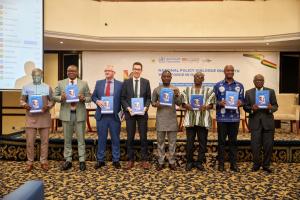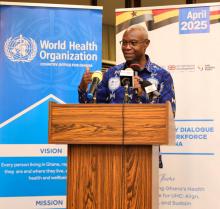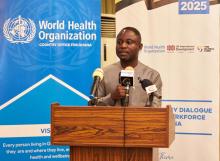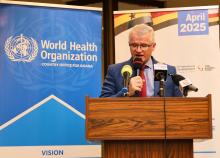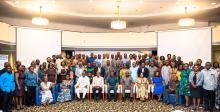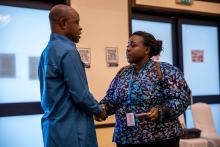Ghana Charts Bold New Path for Health Workforce Transformation
With a health workforce density that has more than doubled in the past two decades — rising from 16.56 to 41.92 per 10,000 people — Ghana continues to make important strides toward achieving Universal Health Coverage (UHC). But in spite of these strides, serious challenges persist. Many qualified professionals remain unemployed due to fiscal constraints. Others, including experienced specialists, are leaving for opportunities abroad. At the same time, underserved areas continue to experience critical shortages.
These complex realities underscore the need for bold, strategic action. To help address them, WHO Ghana supported the Ministry of Health to host a landmark National Policy Dialogue on Ghana’s Health Workforce on 9–10 April 2025, under the theme: “Transforming Ghana’s Health Workforce for UHC: Align, Invest, and Sustain.”
The dialogue brought together high-level officials from government, quasi-government , key collaborating ministries, regulatory bodies, health professional associations, academia, private sector, civil society and development partners — all united by a common goal: to align investments, identify strategic reforms, and develop a comprehensive, sustainable approach to managing Ghana’s health workforce.
A key milestone of the event was the launch of the Health Labour Market Analysis (HLMA) Report, a WHO-supported study that highlights gaps in Ghana’s health workforce supply, demand, and absorption capacity. Findings revealed a growing paradox: despite increasing numbers of trained health professionals, many remain unemployed due to fiscal constraints. At the same time, Ghana needs more health workers to be able to handle the disease burden of the country. The labour market mismatches have led others to migrate in search of better opportunities abroad.
Speaking at the dialogue, Hon. Kwabena Mintah Akandoh, Minister of Health, emphasized the importance of the dialogue.
“This dialogue has given us a clear direction. We now have the evidence, the political will, and the collective commitment to align education, job creation, and investment to meet Ghana’s health needs”, he said.
The four thematic sessions of the dialogue focused on aligning education with labour market demands, optimizing budget space, managing migration through bilateral agreements, and enhancing workforce productivity through improved management.
“We are proud to support Ghana in its journey to build a resilient, well-managed, and equitably distributed health workforce. This dialogue is only the beginning. We are now working with the Ministry to develop an investment plan that translates policy into action”, said Dr Frank Lule, Officer in Charge of WHO Ghana.
The United Kingdom Foreign, Commonwealth and Development Office, one of the key development partners, reaffirmed its commitment to supporting sustainable health systems in Ghana.
“We commend Ghana’s leadership in tackling workforce challenges head-on. A strong, motivated health workforce is essential for delivering quality care, and we are committed to supporting this critical agenda”, said Keith McMahon MBE - Deputy High Commissioner - British High Commission in Ghana.
The policy dialogue concluded, with consensus on strategic policy options for workforce planning, retention, and financing. Moving forward, WHO is supporting the Ministry of Health to develop a comprehensive investment plan that ensures alignment of investments to create and sustain jobs across public and private sectors for Ghana’s health workforce towards universal health coverage
Together, Ghana and its partners are transforming words into action, laying the foundation for a healthier, more equitable future.
For Additional Information or to Request Interviews, Please contact:
Abdul-Lahie Abdul-Rahim Naa
Communications Officer
WHO Ghana Country Office
Email: abdullahiea [at] who.int (abdullahiea[at]who[dot]int)
Tel: +233 20 196 2393



